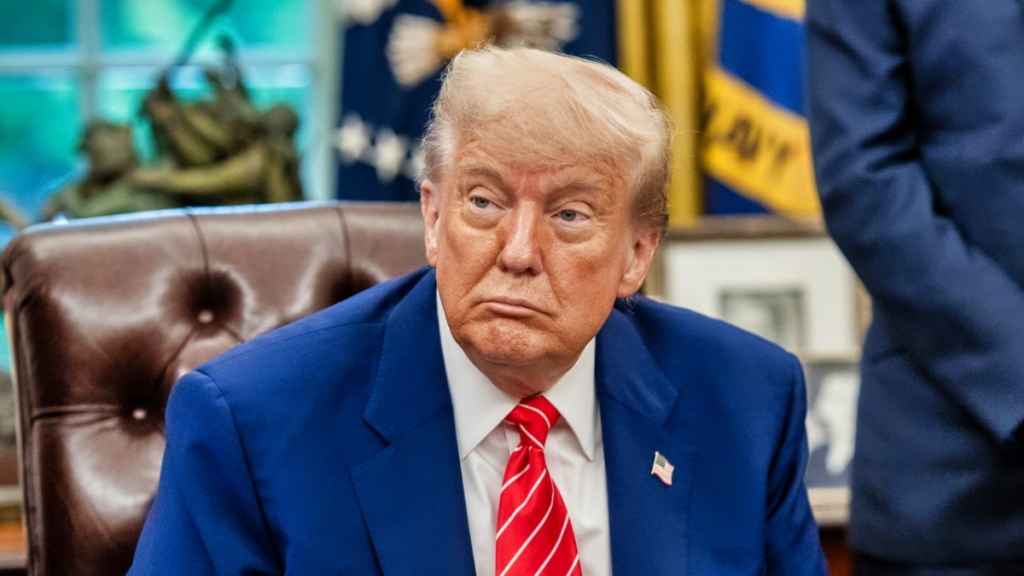WASHINGTON, D.C. — As President Donald Trump moves through the midpoint of his second term, his approval ratings reveal a deeply divided nation grappling with economic uncertainties and contentious foreign policy decisions.
Recent polls provide a mixed portrait of public sentiment, reflecting both staunch support from his base and rising concerns among independents and Democrats over his administration’s handling of key issues.
Current Landscape of Approval Ratings
According to a recent Reuters/Ipsos poll conducted from May 16 to May 18, 2025, President Trump’s approval rating has dipped to 42%, down two percentage points from the previous week. This decline is largely attributed to growing unease over economic conditions, including inflation and tariff-related price increases.
In contrast, the Harvard CAPS/Harris poll paints a somewhat rosier picture, with 47% of Americans approving of Trump’s job performance.
This uptick in approval is linked to recent tariff rollbacks and successful trade negotiations with major partners such as the United Kingdom and China, which have tempered some economic worries among the public.
Issue-Specific Public Opinion
Digging deeper into issue-by-issue approval, the Marquette Law School poll, conducted between May 5 and May 15, 2025, offers a detailed view of where Trump stands on key policy areas:
- Border Security: Trump holds a solid +12 net approval rating here, with 56% of respondents supporting his approach. This reflects ongoing voter concern about immigration enforcement and national security.
- Immigration Policy: Public opinion on immigration is sharply divided, resulting in a neutral net approval rating of 0. While some appreciate tougher enforcement, others call for more humanitarian reforms.
- Foreign Policy: Trump faces a net disapproval of -14, with 43% approving and 57% disapproving of his international conduct. Controversies such as the diplomatic tension with South Africa and handling of global alliances weigh heavily.
- Economic Management: The economy is a major sticking point, with a net disapproval of -16. Many Americans express dissatisfaction with inflation levels and cost of living increases despite some economic growth indicators.
- Tariffs: This policy remains one of Trump’s most unpopular, with a steep net disapproval of -26. Critics blame tariffs for driving up consumer prices and disrupting trade.
- Inflation/Cost of Living: The most pressing issue, inflation, carries the worst net rating at -32, underscoring widespread concern about everyday expenses.
Economic Challenges Influence Public Perception
Economic factors loom large in shaping public opinion of President Trump’s leadership. While inflation has seen some moderation compared to its peak, recent tariff policies have revived fears about rising costs.
A majority of Americans—73%—expect consumer prices to increase as a result of tariffs, according to a Reuters/Ipsos survey, with 57% opposing these trade measures.
In response to these concerns, the Trump administration has taken steps to rollback certain tariffs and broker trade agreements aimed at easing tensions with economic partners.
These efforts have contributed to a modest rebound in approval ratings and public optimism about the country’s economic direction.

Foreign Policy Under Scrutiny
Foreign policy remains a source of contention for President Trump. A recent episode involving a heated exchange with South African President Cyril Ramaphosa over claims of “white genocide” in South Africa has sparked diplomatic strain and drawn sharp criticism from domestic and international observers.
Moreover, Trump’s aggressive immigration enforcement policies, including controversial deportation actions, have eroded support among many Americans, especially in urban and minority communities.
Calls for a more compassionate approach to immigration reform have intensified, reflecting a growing divide between the administration’s stance and public sentiment.
Partisan Divides and Voter Shifts
Despite challenges in the broader electorate, President Trump continues to enjoy strong approval among Republican voters.
A recent focus group in Wisconsin, a key swing state, revealed that some voters who supported President Biden in 2020 are shifting towards Trump.
Participants cited his decisive leadership style and promises to tackle longstanding national issues as motivating factors.
Interestingly, some polls suggest a slight uptick in approval ratings among Democrats, indicating a complex and evolving political landscape that defies simple partisan explanations.
Looking Ahead: What Comes Next?
President Trump’s approval ratings in May 2025 highlight the polarized nature of American politics and the competing priorities of the electorate. Economic concerns—especially inflation and cost of living—remain paramount for many voters, while foreign policy controversies and immigration debates continue to shape perceptions.
As the administration navigates these challenges, upcoming policy decisions and international engagements will be crucial in defining Trump’s legacy and public standing.
The ability to balance economic growth with consumer protection and to manage diplomatic relationships thoughtfully will likely determine whether his approval ratings stabilize or continue to fluctuate.
For further information: Reuters/Ipsos Poll on Trump’s Approval
Disclaimer – Our team has carefully fact-checked this article to make sure it’s accurate and free from any misinformation. We’re dedicated to keeping our content honest and reliable for our readers.
